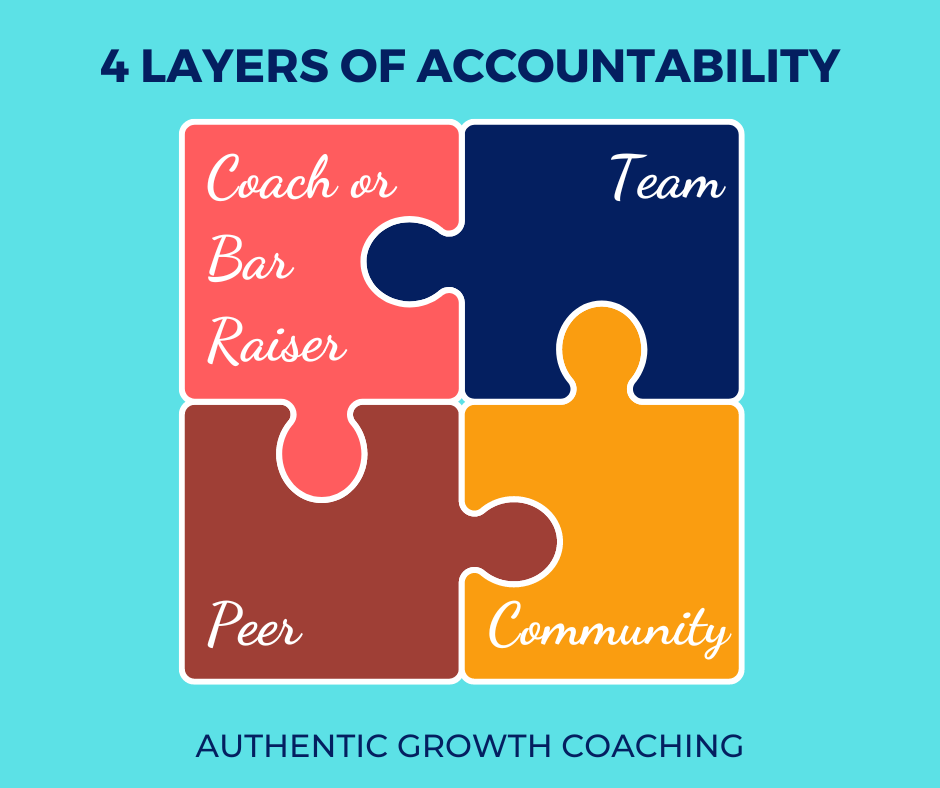 We all have dreams, goals, and aspirations that we strive to achieve. However, the journey towards success can often feel overwhelming and lonely. We face self-doubt, resistance, and the fear of failure. Fortunately, there is a proven solution to overcome these challenges and reach our full potential: accountability. Understanding the four layers of accountability can transform your life and propel you towards success. By embracing these layers, you will tap into the power of guidance, competition, transparency, and community support, ultimately accelerating your path to greatness. Coach or Bar Raiser: Reaching New Heights The first layer of accountability involves enlisting the help of a coach or bar raiser. The most accomplished individuals in any field recognize the value of having a mentor who sets a standard of excellence and pushes them beyond their comfort zones. A coach challenges your excuses and motivates you to achieve greatness. They bridge the gap between self-doubt and success, nurturing your growth and inspiring you to take bigger risks. Over time, their guidance becomes internalized, transforming your mindset and allowing you to reach new heights. Consider the process of kneading bread. Just as the taste and texture improve with each moment of kneading, so does your personal development when guided by a coach who believes in your potential. Team: Harnessing the Power of Competition Accountability also thrives within a team setting. Surrounding yourself with like-minded individuals who share similar goals creates a powerful dynamic of competition and camaraderie. Witnessing the success of others erodes the power of your excuses, igniting a fire within you to achieve the same level of accomplishment. While neurodiverse individuals may face unique challenges, acknowledging the need for personalized support is crucial within the context of accountability. By building a scaffold of assistance, they can establish a solid foundation for progress. Friendly competition within a team setting can mask or outweigh fear, inspiring action and propelling you forward. To unlock your full potential, you need a team that will challenge, encourage, inspire, and compete with you, driving you to exceed your own expectations. Peer: Honest Reflection and Growth In addition to a team, forging a one-on-one relationship with a peer at a similar level is immensely valuable. This layer of accountability allows for honesty, transparency, and personal growth. A "mirror buddy" acts as a neutral sounding board, reflecting your thoughts and progress back to you. Their unbiased perspective provides a space for you to externalize your emotions and challenges. It's important to choose a buddy who prioritizes your success and growth over maintaining a personal relationship. By engaging in regular conversations and asking each other the hard questions, you gain invaluable insights, enabling you to navigate obstacles and maintain focus on your goals. Community: The Strength of Declarations The final layer of accountability resides in a supportive community that encourages public declarations of aspirations and desired outcomes. When you publicly share your goals, you tap into a wellspring of motivation. The fear of disappointing others becomes a driving force, compelling you to follow through on your commitments. By embracing a community of like-minded individuals, you create a network of support and encouragement. The collective energy of the community fuels your determination, propelling you towards success. Why settle for the slow and hard way when a coach can guide you, a team can push you, a peer can challenge you, and a community can uplift you? Embracing accountability in all its layers is an investment in yourself and an acknowledgement of your worthiness. Pride, ego, or uncertainty may hold you back, but by prioritizing your growth and surrounding yourself with the right support system, you unlock your true potential and achieve your goals with greater speed and ease. Accountability is the catalyst that transforms dreams into reality. By embracing the four layers of accountability – a coach or bar raiser, a team, a peer, and a community – you unlock your full potential and propel yourself towards success. Building discipline and overcoming self-doubt become easier when you have the guidance, competition, transparency, and support of those around you. So, why choose the slow and hard way when a world of possibilities awaits? Invest in yourself, embrace accountability, and witness the transformative power it holds. Dare to dream, dare to be accountable, and dare to achieve greatness
0 Comments
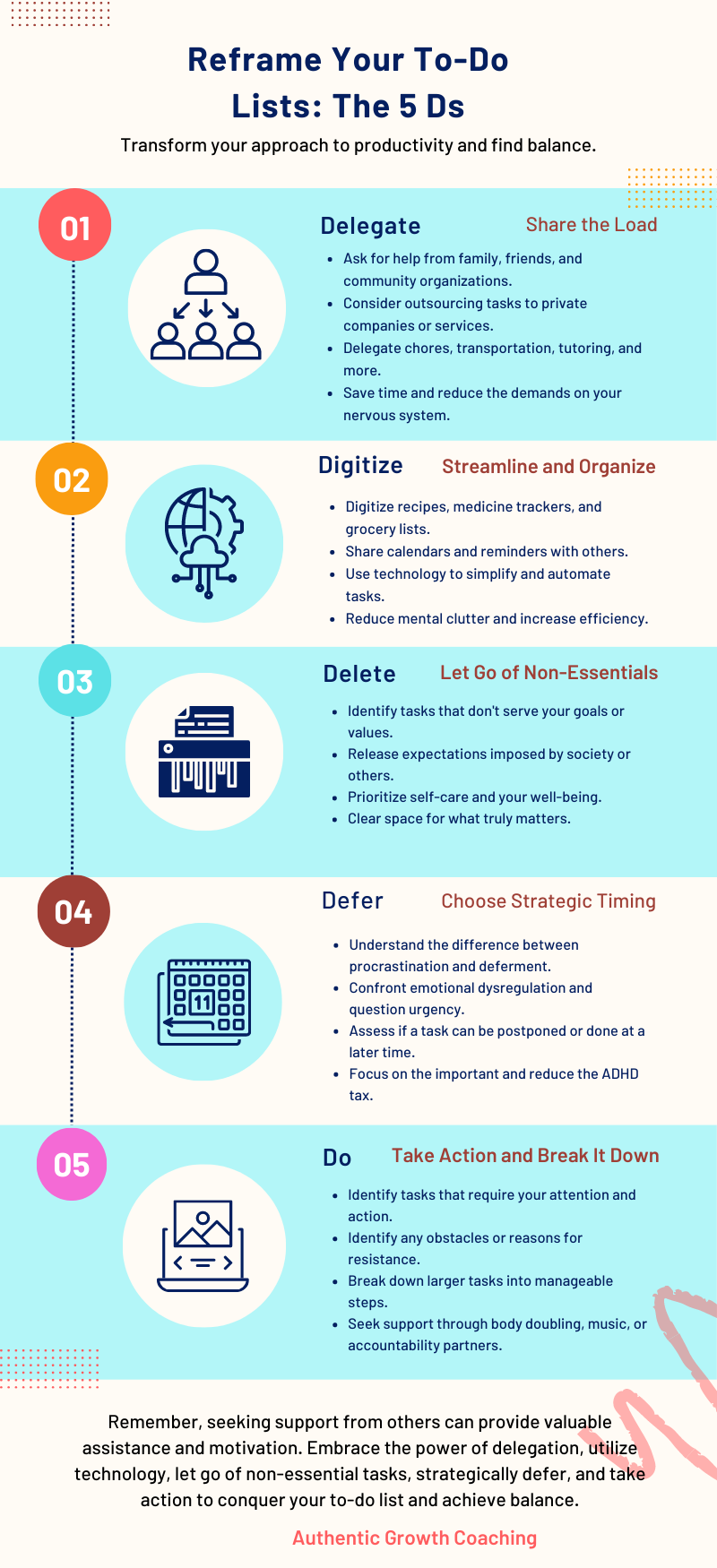 Transform your approach to productivity and find balance. Delegate - Share the Load
Digitize - Streamline and Organize
Delete - Let Go of Non-Essentials
Defer - Choose Strategic Timing
Do - Take Action and Break It Down
Remember, seeking support from others can provide valuable assistance and motivation. Embrace the power of delegation, utilize technology, let go of non-essential tasks, strategically defer, and take action to conquer your to-do list and achieve balance. I have gotten really excited to try a new craft many times, only to invest and realize I didn't like it.
 "When you listen to a good story, the brain triggers the release of the hormone oxytocin. In lay terms, this is known as the relationship hormone. . . It's a hormone that orients us with compassion toward another. So it orients us toward collaboration. Think of that. Listening to a good story actually produces an orientation toward compassion and focus on the other." Dr. Ronald Fry, Case Western Reserve University - Leading Positive Change Through Appreciative Inquiry This idea of the stories we tell is important - stories fill our soul’s “cup” (as well as our brain with good chemicals), and we need to consciously look for stories that fill that cup more. But we can also fill that cup with better stories about ourselves. We can keep an eye out for where we’re making progress on correcting mistakes - they didn’t happen in one fell swoop, and correcting them doesn’t happen overnight. But appreciating how far we’ve come really helps us write a stronger narrative that we can make change. And minor set-backs are not terrible losses; they are stumbles on the journey to get better as a person. Another side of this: Hal Hershfield’s team found that participants’ brain activity while considering their Future Selves more closely resembled brain activity while thinking about a current other rather than the current self. (Hershfield is a psychologist at the UCLA Anderson School of Management) Ed Yong, professor at Boston College, wrote that “Empathy depends on your ability to overcome your own perspective, appreciate someone else’s, and step into their shoes. Self-control is essentially the same skill, except that those other shoes belong to your future self—a removed and hypothetical entity who might as well be a different person. So think of self-control as a kind of temporal selflessness. It’s Present You taking a hit to help out Future You.” We can extend more compassion to another person than we can to ourselves, but when we understand better how our brain is wired differently, we need to see our Future Self as a person who deserves compassion as well. Understanding that our brain is wired differently can also allow us to know how we are likely going to have problems. If we see our Future Self (who may not remember what Previous Self was thinking when PS did something, because the other 1052 tabs open in our brain were sapping our "bandwidth"), as a separate person who we need to communicate with, just like other people, we can start to make habits that help us better communicate with our Future Self. This is a new story, one where we’re writing Present Self as empathetic and caring, who sets Future Self up for success. This is also an opportunity to learn how best to communicate with Future Self - to build new skills for success. Literature often holds a mirror to the real world - and movies and television shows are an extension of those. As such, they can hold a grimy, dark mirror; a gilded, hazy mirror, or even a fun-house mirror of the world up for us to look at.
Science fiction, especially, can hold a double image up as a mirror - an aspirational future, a dark future, a conflicted future; and the truth now, if you have the perspective to see it. I love Star Trek: Picard for too many reasons to list here, but I’m thinking today about The Way of Absolute Candor of the Qowat Milat. “The Way of Absolute Candor was the primary teaching of the Qowat Milat , an order of Romulan warrior nuns. It emphasized the total communication of emotion without filter between thought and word, resulting in the Qowat Milat being blunt and direct in conversation. The concept ran counter to everything that Romulans normally held dear.” I’m also thinking, today, about an important discussion posted to FB by Reina Lin begun by Marco Rogers, @polotek onTwitter, had regarding how “white people don’t have the concept of “real conversations” - we “can’t stop saying the diplomatic thing and tell people what’s really going on”, and it’s what causes Black people to feel that they can’t “form real trust relationships with white people”, because we can’t handle the truth. I don’t want to talk over his excellent points, but I want to say that some neurodiverse people also have difficulty with the “rituals” in which white (NT) people “decide” what’s going on. This lack of candor can harm neurodiverse people’s ability to navigate these spaces, as well. Again, I want to draw a parallel line with his argument, because this lack of candor harms a lot of people, and learning candor will need to happen for true Diversity, Equity, Inclusion and Belonging. Another Twitter user, Laura Bridgewater, @knit1write2, aptly points out that “WASPs never discuss anything directly, but they’ll come at you sideways with a glass knife.” As an undiagnosed ADHD adult trying to navigate the working world, I probably swung between candor and saying completely the wrong thing plenty, and I learned to overcompensate as an Avoider and a Pleaser now. I have, unfortunately, leaned into the passive-aggressive side. I MUST unlearn this. @SerenissimaL’Azzura brings up that “white women are tasked with sensing that “real talk” might be on the horizon, and “smoothing things over” to keep that from happening. Many of us have internalized the notion that we are responsible for other arguing to the point that we cry when we are unable to keep the peace. It’s out of a genuine and completely misplaced sense of failure, but it also serves the purpose of redirecting peoples’ from whatever they were “fighting” about. This is also know as “White women’s tears”. We need to stop it.” Lisa Delpit’s work “Other People’s Children” on how “WASP teachers routinely demonize Black children by misinterpreting direct language as verbal assault and how black kids routinely can not get the clarity of communication they need from white staff. This is an issue of institutionalized racism that is central to the school to prison pipeline.” ([Treebyleaf McCurdy] brought this up). In looking for more information on how to do this, I found Radical Candor: “Radical Candor is Caring Personally and Challenging Directly, Not Brutal Honesty” I need to learn radical candor now, to ensure that I don’t hold the truth back, and that I allow fruitful conversations to occur so everyone can be successful. I don’t expect this to be easy, but I would love others to join me. Well, it happened . . . I've been vaccinated, boosted, and did my best to stay away from others, but I got COVID at a family gathering. So today I'm posting something I started to put together a while ago but hadn't shared here. I hope this will be useful for parents like me who may have a house full of people, but still feel a need for connection.
Some people are built to be alone. Others struggle tremendously with solitude. Most people are somewhere in the middle. If you’re used to more human contact than you’ve been receiving lately, you know that it can be uncomfortable. Humans are social creatures. Historically, we’re not well-equipped to conquer the world alone. The ability to survive alone is a recent phenomenon. There’s a part of you that needs to be around others. Manage your isolation in a healthy manner with these strategies:
There are also many ways to interact with others, even if you can’t share a confined space with them. Six feet isn’t that much to overcome if you’re flexible and creative. Remember that others share your frustration. Things will eventually get back to normal. However, if you're yearning for connection to other adults who are seeking support and community, I have partnered with Stephanie Zoernack of Soulful Growth Heath Coach to bring Women's Wellness Warriors to offer new ideas, support, and space for others yearning to connect again. Click here to learn more. Decision trees are tools used by people to help them make confident decisions. It helps them layout several alternatives in a tree-like format. They can see most, if not all, the decisions available and can even set a rating on each choice.
The concept of a decision tree is an extension of a mind map. A mind map lets you create ideas and connections to those ideas. The decision tree is much like this concept except for a decision tree there is a score added to the branches of the tree. These scores often represent probabilities. If you have three choices, you may assign two branches with 40% probabilities, and the third branch would receive a 20% probability. The total of the branches should add up to 100%. However, it is your decision tree, so you are free to use whatever allocations you like if any. If your system makes sense to you, then it is correct. Some project managers use decision trees to determine the costs of projects. When they assign probabilities to branches, they’ll multiply the total budget by that probability. For instance, if a branch has a probability of 35% and the total budget is $100,000, the branch will be estimated to cost $35,000 (35% x 100,000). Decision trees don’t have to be this intricate to be useful. You can use them to list out the alternatives for a decision and end your efforts there. You can also choose to update the percentage of completion for the path that you select. Again, there are no right answers when using a decision tree for your purposes. When others rely on your decision tree, and you are formally calling it a decision tree, you may need to follow the protocol of assigning probabilities and figuring out the percentage cost. However, if the group agrees to other conventions, then again, that is the right answer for the group. A decision tree is simply a way to convey information to yourself or a team, etc. Decision trees will have a certain amount of subjectivity associated with them. In most cases, coming up with probabilities is quite subjective. It’s only through experience that you’ll be able to refine the probabilities. If the project you are working on is a one-time deal, you won’t get the benefit of refining those probabilities and will have to start over with a new set of subjective probabilities on the next project. However, some branches may carry over to the new project, and you’ll have a better feel for what to assign to those. When faced with decisions, those of us with ADHD may fall into two categories - you want to have the best information possible before moving forward, or you jump without looking.
Some people spend too much time trying to find as much information as they can, and they miss opportunities because of it. Information is a key component in decision making. However, sometimes, you simply have to decide and live with the decision without any information. You don’t want others to view you as someone who makes rash decisions. You’ll lose credibility when you do this and people won’t take you seriously. However, you must prepare yourself for certain times where being decisive is necessary. For instance, you may be registering for classes at your college and discover that a few of the courses you were hoping to take are full. You are given other choices but are unsure of how that will fit into your overall plan. Do you enroll in those alternative classes? You may decide to go for the classes. If they are part of your curriculum, you can always rework your plan so that they fit in. Talk to your academic advisor and ask how to proceed after taking this new path. Of course, you could always drop the classes if they don’t fit well. The point is if a decision doesn't work out the wrong results can usually be fixed. Don’t be afraid to take the plunge. The shoe company Nike has a slogan that has worked for them for several decades now. That slogan is 'Just Do It!' A structured living doesn't fit well with some people. They need the excitement that comes with making spontaneous decisions. Who is to say that their way is wrong? It may not work for others, but for them, it works quite well. You may know people who are like this and are envious of them. That isn’t the same scenario as people who don’t do much with their lives. Spontaneous decision makers are often doing many activities. You can decide to do nothing, but you won’t get very far. Unless you are lucky enough to come from money and your parents are willing to give you that money, you will need to find something to do. Most people will find a balance of decisions they make based on information and spontaneous decisions. The process of decision making becomes easier the more you do it. Therefore, when you need to make spontaneous decisions, it will not be as difficult after a while. Which ever category you fit into, find a way to accept that about yourself and view the outcomes as experiments that you learned from. Shame spirals don't help you progress - they keep you rooted in place. Next time a decision didn't work out like you wanted, yell "Plot twist!" and try something new, but learn from the outcome of your decision. Let me know if you need to talk through the results to find the bright side. 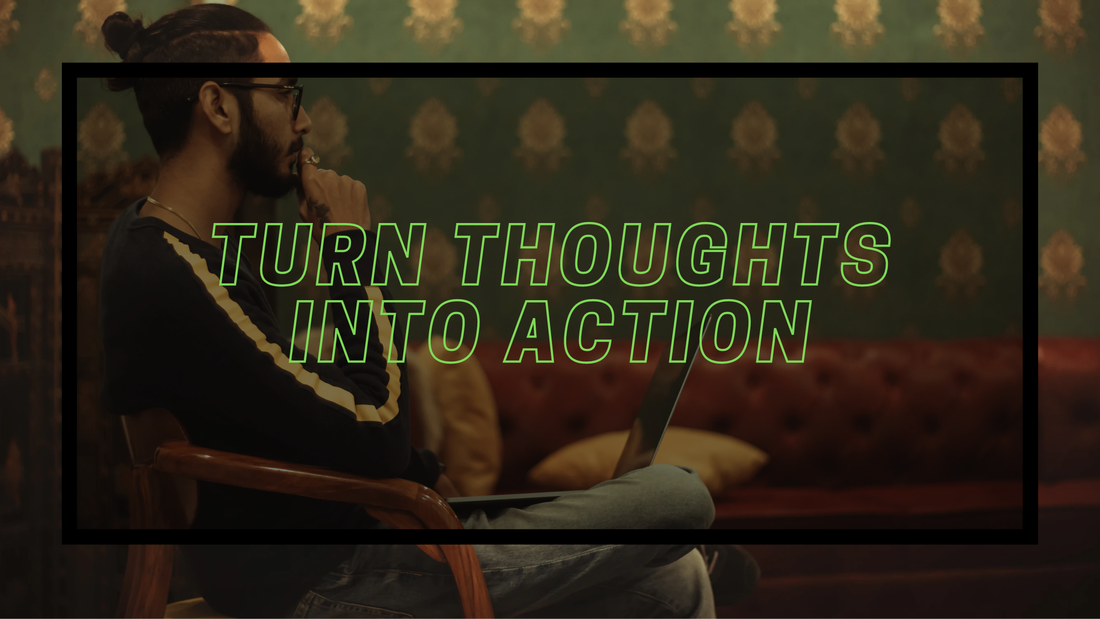 Do you have big plans for your life? Dreams that you want to turn into a reality? This is often easier than done, especially when you don't know how to start taking action in the first place. Below are some ways to help you more effectively turn your thoughts into actions, no matter how crazy they may be. Start By Making A Plan Usually, when someone has a plan in their head, it can be a bit chaotic and maybe hard to see exactly how to get there. This is why you should start by making a physical, written-down plan of what you want to do. This might start as a brain dump, but sort through and start to piece your plan together. This will give you a better view of where to go to start. This will also help you to break your goals down into more manageable steps. Don’t think that just because you write a plan that it has to happen exactly that way either, as once you start to take action, you can come back and adjust your plan as needed. Stop Overthinking Everything One of the reasons you may find yourself unable to turn thoughts into actions is probably because you are overthinking everything. The above step of making a plan should help you to clear up your overthinking a little bit as you write things down. But if it doesn't, other mental relaxation techniques like meditation, talking something out with others, and taking a deep breath can help you stop overthinking. Remember, you aren't perfect, and that isn't what you are trying to achieve, so there is no reason to fret over your mental plan being perfect. Figure Out What Is Stopping You From Taking Action If you've done the two above steps but still can't seem to turn your thoughts into action, it's time to figure out why. Are you scared of failure? Too distracted? Waiting for the perfect time? Any of these can hold you back as you work to make your thoughts become a reality. If you leave them unchecked, you will never be able to take meaningful action. So once you discover why you can't seem to take action in your life, work through why and eliminate it from your life so that it is no longer a reason. Turning your thoughts into action is often easier said than done, especially if you aren’t sure where to start and are overthinking everything. The trick is, you need to figure out what is stopping you from turning your thoughts into action, cut out the overthinking, and start following a plan that you have written down—and before you know it, your thoughts will become actions! 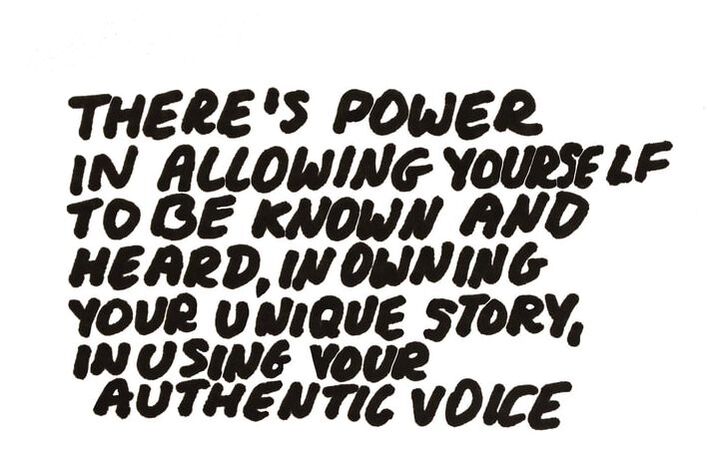 You may notice that Authenticity is a little important to me - so important that I put it in the name of my company. It's one of my Core Values. And yet I still struggle with it. People often pretend to be something or someone they aren’t. Often in social situations, people act differently than they do with their close friends and family. However, it’s important to stay true to who you are, i.e., to be your authentic self. It’s natural that people want to be accepted but the key to staying true to yourself is not worrying too much about what others think or believe. People should accept you for who you are. Don’t waste your time on people who don’t. You can’t live up to the person you are pretending to be. If you aren’t being your authentic self, you will falter at some point. It’s not a matter of if, but when. Did you ever notice that people who lie, often tell a different story later? This is because they won’t remember what the story was in the past and have no choice but to make up new details. If you are pretending to be someone you are not, this is essentially the same as lying. Know who you are. It’s important to know yourself. This may seem like an obvious statement, but many people don’t know who they are. Dig deep to discover the subtle aspects of your life that you tend to ignore or keep hidden. There is no need to hide your true personality because that is who you are. You can’t change that. Stop trying to be someone else. Everyone has people they look up to. However, looking up to someone and trying to be them is not the same. It’s worthwhile to emulate some of their desirable traits, but make sure you aren’t stepping outside of who you are deep down. Don’t compromise on your values. If you believe in something, stand firm. Sometimes, you’ll have no choice to make some compromises, but don’t cave in if they go against your beliefs. You must live with these choices. You want to be able to sleep at night. Negativity should not be a character trait you accept. You won’t get far with negativity. If you are a negative person, this is not who you truly are. Remember, you don’t come out of the womb being negative. It’s something you learn. It’s time to unlearn it. Keep a Journal. Keeping a journal is one of the best ways to figure out “who you are”. People often find that it is easier to be honest when writing down their thoughts. A journal will allow you to reflect on who you are, and then you can act accordingly. Join me as I continue to work on my own Authenticity, and present myself, warts and all, because I know I am enough, and I know I have a ton to offer. And so do you. |
Author
I am overwhelmed, I am tired, but I am determined. My children deserve to enjoy the benefits of our ADHD gifts, and so do I. Archives
June 2023
Categories |

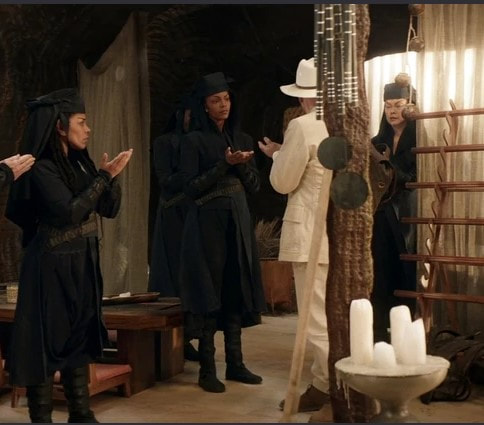
 RSS Feed
RSS Feed
